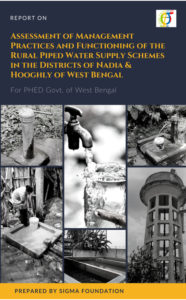Assessment of Management Practices and Functioning of the Rural Piped Water Supply Schemes in the Districts of Nadia & Hooghly of West Bengal
Contributed By: Dr. M.N. Roy, Mr. Amiya Bannerjee, Dr. Debasri Mukherjee, Dr. Sabari Bandyopadhyay, Mr. Biswajit Chakraborty, Mrs. Mayuri Sen, Mrs. Sayanti Majumdar, Ms. Debasree Bose, Ms. Poulami Basu, Mrs. Sohini Tarafdar, Ms. Nilanjana Mukherjee, Mr. Debojyoti Majumder and Mr. Ganesh ChoudharyThe Ministry of Drinking Water and Sanitation (MDWS) of the Government of India (GOI), in its ‘Strategic Plan 2011-22 for rural drinking water in India, had set the goal to ‘Ensure that at least 55% of rural households are provided with piped water supply; at least 35% of rural households have piped water supply with a household connection; less than 20% use public taps and less than 45% use hand pumps and other sources. The Public Health Engineering Department, Govt. of West Bengal took steps to ensure more robust management of water supply and water quality with the partnership of Panchayat & Rural Development Department for implementing its project at the grass root level. According to the guidelines of NRDWP (2013), VWSCs are to be responsible for planning, designing and implementing all village drinking water & sanitation activities. The process of transfer of PWSS from PHED to GPs/VWSCs actually started from 2015 and was still going on during the time of the study. PHED felt it necessary to review the functioning of PWSSs. SIGMA Foundation was selected to take up the study in two districts namely Nadia and Hooghly in West Bengal. The study had three broad dimensions to be probed for meeting the objectives stated before through field survey. The first one was to assess the performance of the PWSSs compared to the designed parameters in supplying water. The second one was to understand the institutional aspects of managing the schemes and the last one was on quality of services being received by the people. Total numbers of handed over schemes by PHED to GPs/VWSCs in Nadia and Hooghly districts were 29 and 50 respectively. Principle of purposive sampling was used and total 6 handed over PWSS, 4 in Nadia and 2 in Hooghly, were identified for the study. After analysing the data collected from the survey it was observed that (i) a proper process for handing over of the schemes should be followed which is still missing (ii) the awareness building should cover the assets to be transferred, the responsibilities that the GP will be required to bear, (iii) there is need for proper orientation of the GPs on universal access to safe water, preferably piped to the premises, (iv) there is need for preparation of annual plan as per a perspective plan, which should be taken up under the GPDP, (v) The responsibility for managing the PWSS involves several activities for which there is need for appropriate institutional arrangement, (vi) the wastage of water cannot be prevented without active support of the community. The VHSNCs are to be oriented to watch on the losses and to take up advocacy on conservation of water, (vii) involvement of the community will require the GP to be responsive to the need of the people and prompt action on their grievances, (viii) the PRDD may come out with a list of monitorable indicators and educate the GP functionaries to not only capture relevant data but monitor their performance based on those indicators, (ix) a suitable web-based MIS should be developed to report the status from each GP on how the PWSS are functioning, and (x) there is need for proper coordination of all the stake holders. All the stakeholders should be associated with the monitoring process and to ensure proper coordination in sorting out the problems and rectifying the weaknesses of the GPs.

